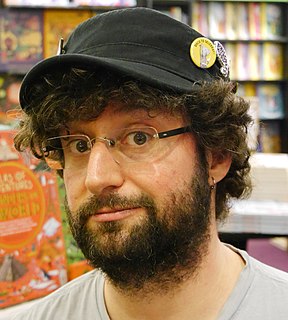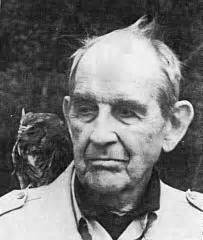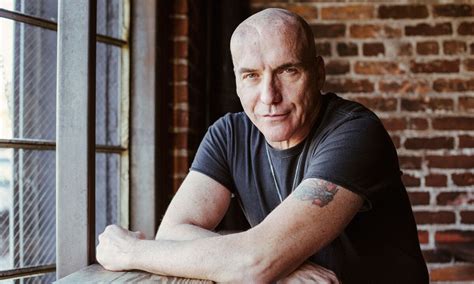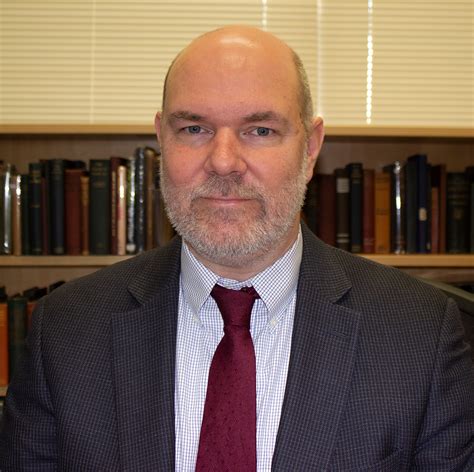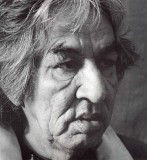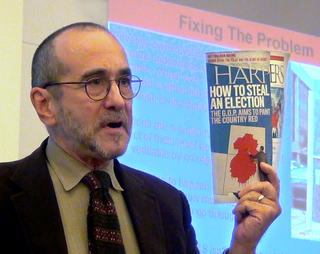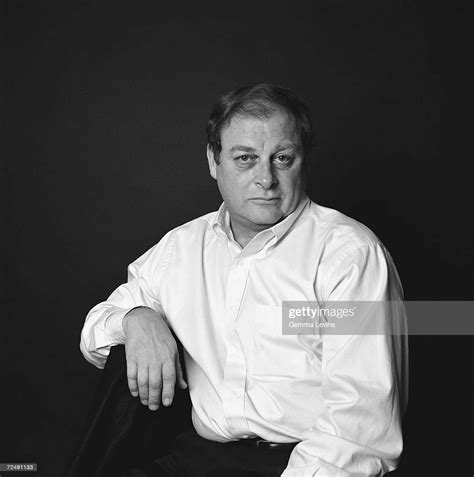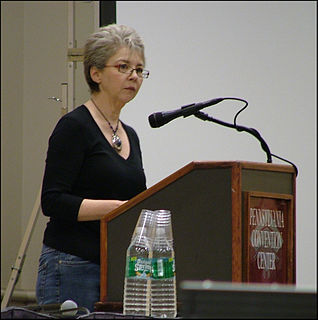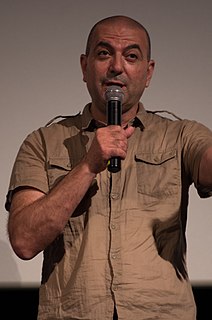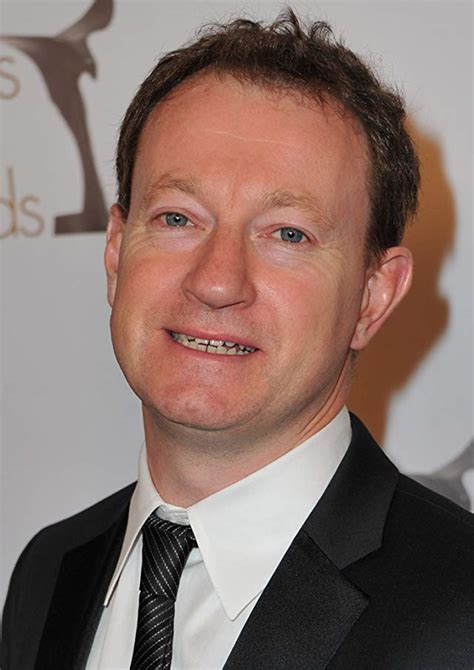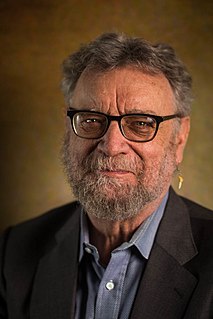Top 1200 English Grammar Quotes & Sayings - Page 16
Explore popular English Grammar quotes.
Last updated on December 18, 2024.
English was my fourth language. I arrived, I enrolled in public school, as a child, I believe I was about six years old when we finally landed in Michigan. And I was initially put in special education because I couldn't quite wrap my mind around the English language because I was listening to Hungarian and Albanian and German. My mind broke down like I couldn't quite wrap my mind around the fourth language.
[from The One and Only Official Mr. Gum Official Glossary That Tells You What Words Mean by Explaining Them Using Other Words] : Cups of tea: People in England are always drinking cups of tea. "Oh let's have a cup of tea " they say. "That will prove we are English and not American." Sometimes American people try to have cups of tea to pretend they are English but forget it We can always tell you are faking it
India was China's teacher in religion and imaginative literature, and the world's teacher in trignometry, quandratic equations, grammar, phonetics, Arabian Nights, animal fables, chess, as well as in philosophy, and that she inspired Boccaccio, Goethe, Herder, Schopenhauer, Emerson, and probably also old Aesop.
The price a world language must be prepared to pay is submission to many different kinds of use. The African writer should aim to use English in a way that brings out his message best without altering the language to the extent that its value as a medium of international exchange will be lost. He should aim at fashioning out an English which is at once universal and able to carry his peculiar experience.
One of the greatest pleasures I get from my measly professional career is confusing people. "Wait - he beats women and seems like a Nazi, but he has impeccable grammar and keen reasoning skills and sings country music and can, from time to time, say or do something really funny?" It absolutely doesn't compute for them. I enjoy that immensely.
I need geometry to set the grammar of the image expressive language . The structural skeleton, the composition and the geometric layout provide a perspective from which one can read the image; otherwise we would do what Dadaists did when they put words in a little bag and then took them out at random in order to compose a poem.
Like so many other grammar schools that flourished in Britain before they were abolished through a mix of ideology and political folly, Harrow County was a fiercely competitive institution, where all boys were taught to strive for excellence. It was precisely because of this demanding regime that results were so good.
In my youngest days, the nuns at my grammar school drummed into us that we were in this world to make it a better place - not just for ourselves, but for other people, too. So from the very beginning, I've been driven by this idea that we have to make a difference, and it's one of the reasons I went into law in the first place.
Burns from dropped matches, Ms. Lane? Matches one might have dropped while flirting with a pernicious Fae, Ms. Lane? Have you any idea the value of this rug?” I didn’t think his nostrils could flare any wider. His eyes were black flame. “Pernicious? Good grief, is English your second language? Third?” Only someone who’d learned English from a dictionary would use such a word. “Fifth,” he snarled. “Answer me.
I think of myself primarily as a reader, then also a writer, but that's more or less irrelevant. I think I'm a good reader, I'm a good reader in many languages, especially in English, since poetry came to me through the English language, initially through my father's love of Swinburn, of Tennyson, and also of Keats, Shelley and so on - not through my native tongue, not through Spanish. It came to me as a kind of spell. I didn't understand it, but I felt it.
We were doing the same thing. We will never have "a" Chicano English or Spanish because of regional differences. But I think that because of our bilingual history, we'll always be speaking a special kind of English and Spanish. What we do have to do is fight for the right to use those two languages in the way that it serves us. Nuevo-mexicanos have done it very well for hundreds of years, inventing words where they don't have them. I think the future of our language is where we claim our bilingualism for its utility.
There are certain concepts, which exist in English, and are unthinkable, untranslatable into Hebrew and vice versa. Hebrew has a system of tenses, which is, in a big way, different from the English system of tenses, probably different than any European system of tenses, which means a different sense of reality, which means a different concept of time. So, things can be translated, but they become different.
I think it's good for anybody to learn languages. Americans are particularly limited in that way. Europeans less so... We're beginning to have Spanish move in on English in the states because of all the people coming from Hispanic countries... and we're beginning to learn some Spanish. And I think that's a good thing... Only having one language is very limiting... You get to think that's the way the human race is made; there's only one language worth speaking... Well, this isn't good for English.
The English also had a reputation, shared with the Dutch, for blowing up their ships to avoid capture. In 1611, for instance, the Spanish Admiral Don Pedro de toledo captured a Turkish pirate ship, but its English consort, 'being wont to seek a voluntary death rather than yield, blew up their ship when they saw resistance useless'. Blowing up their ships, or at least threatening to do so, would become standard pirate practice.
Although the only way that I'm well known at Illinois State is that I am the "grammar Nazi." And so any student whose deployment of a semi-colon is not absolutely Mozart-esque knows that they're going to get a C in my class, and so my classes tend to have like four students in them. It's really a lot of fun.
...despite all this, it is still hard to admit that there is no one more English than the Indian, no one more Indian than the English. There are still young white men who are angry about that; who will roll out at closing time into the poorly lit streets with a kitchen knife wrapped in a tight fist. But it makes an immigrant laugh to hear the fears of the nationalist, scared of infection, penetration, miscegenation, when this is small fry, peanuts, compared to what the immigrant fears - dissolution, disappearance.
My basic idea is that programming is the most powerful medium of developing the sophisticated and rigorous thinking needed for mathematics, for grammar, for physics, for statistics, for all the "hard" subjects.... In short, I believe more than ever that programming should be a key part of the intellectual development of people growing up.
I could wish there were a treaty made between the French and the English theatres, in which both parties should make considerableconcessions. The English ought to give up their notorious violations of the unities, and all their massacres, racks, dead bodies, and mangled carcasses, which they so frequently exhibit upon their stage. The French should engage to have more action, and less declamation, and not to cram and to crowd things together to almost a degree of impossibility from a too scrupulous adherence to the unities.
One of the things I love about translation is it obliterates the self. When I'm trying to figure out what Tu Fu has to say, I have to kind of impersonate Tu Fu. I have to take on, if you will, his voice and his skin in English, and I have to try to get as deeply into the poem as possible. I'm not trying to make an equivalent poem in English, which can't be done because our language can't accommodate the kind of metaphors within metaphors the Chinese written language can, and often does, contain.
I transmit astral plane harmonies through my brushes into the physical plane. These otherworld colours are reflected in the alphabet of nature, a grammar in which the symbols are plants, animals, birds, fishes, earth and sky. I am merely a channel for the spirit to utilize, and it is needed by a spirit starved society.
The feeling persists that no one can simultaneously be a respectable writer and understand how a refrigerator works, just as no gentleman wears a brown suit in the city. Colleges may be to blame. English majors are encouraged, I know, to hate chemistry and physics, and to be proud because they are not dull and creepy and humorless and war-oriented like the engineers across the quad. And our most impressive critics have commonly been such English majors, and they are squeamish about technology to this very day. So it is natural for them to despise science fiction.
Languages are fluffy big pillows stuffed between nations - what others say is muffled and nearly lost in them, and when we speak their grammar we get feathers in our mouth. It's worth it. What pleasure to phrase an idea, even in child's words, slowly, and sail it across the gulf in another language to a different-speaking human being!
Most children, even very bright ones, need constant review and practice to truly own a concept in grammar, math or science. In schools today, on paper it may appear that kids are learning skills, but in reality they are only renting them, soon to forget what they've learned over the weekend or summer vacation.
Bush is almost always clear when he's speaking cruelly. For example, when the subject is the punitive infliction of great pain, there is no problem with his syntax, grammar, or vocabulary, even if he happens to be lying. ... On the other hand, our president is extraordinarily tongue-tied when he's trying, off the cuff, to sound a note of idealism, magnanimity or -- especially -- compassion.
What, by a word lacking even in grammar, is called amorality, is a thing that does not exist. If you are unwilling to submit to any norm, you have, nolens volens , to submit to the norm of denying all morality, and this is not amoral, but immoral. It is a negative morality which preserves the empty form of the other.
In England everything is liberalised. Within certain boundaries and rules everybody can do what he likes. Maybe London's society has a different tempo, a different dynamic. London is fast, productive, creative but it is not England. If you want to transfer that to football, you could say: in the four big English clubs and maybe in the one or two behind them there is a top level. Everything that comes after that rather mirrors English society. It's honest, fair and hard, sometimes also fast, but not always so perfect.
We got a copy of the 'New Statesman' at my grammar school in Wigton, Cumbria, in the 1950s. It sat mint fresh every week on the library table, with two or three other bargain-offer magazines. The 'Statesman' came out of the unimaginable Great World. I started to read it then and have pegged along ever since.
I think I succeeded as a writer because I did not come out of an English department. I used to write in the chemistry department. And I wrote some good stuff. If I had been in the English department, the prof would have looked at my short stories, congratulated me on my talent, and then showed me how Joyce or Hemingway handled the same elements of the short story. The prof would have placed me in competition with the greatest writers of all time, and that would have ended my writing career.
Part of what makes a language 'alive' is its constant evolution. I would hate to think Britain would ever emulate France, where they actually have a learned faculty whose job it is to attempt to prevent the incursion of foreign words into the language. I love editing Harry with Arthur Levine, my American editor-the differences between 'British English' (of which there must be at least 200 versions) and 'American English' (ditto!) are a source of constant interest and amusement to me.
Ram Dass, Krishna Dass, we all spoke through interpreters. There were good interpreters there, educated people in India speak English but Maharaji was the One, the Baba, Holy Man, mendicant, he didn't speak English. We talked to him and it was hard to know him, he was an ancient holy man and I was a 21 year old seeker. So I never knew what was going on, I mean I don't really know what's going on now, my guess work is a little better perhaps.
Had there been no Renaissance and no Italian influence to bring in the stories of other lands English history would, it may be, have become as important to the English imagination as the Greek Myths to the Greek imagination; and many plays by many poets would have woven it into a single story whose contours, vast as those of Greek myth, would have made living men and women seem like swallows building their nests under the architrave of some Temple of the Giants.
There is no English equivalent for the French word flâneur. Cassell's dictionary defines flâneur as a stroller, saunterer, drifter but none of these terms seems quite accurate. There is no English equivalent for the term, just as there is no Anglo-Saxon counterpart of that essentially Gallic individual, the deliberately aimless pedestrian, unencumbered by any obligation or sense of urgency, who, being French and therefore frugal, wastes nothing, including his time which he spends with the leisurely discrimination of a gourmet, savoring the multiple flavors of his city.
Still we did not expect to be without rubs and difficulties; and we have had them. First the detention of Western posts: then the coalition of Pilnitz, outlawing our commerce with France, and the British enforcement of the outlawry. In your day French depredations; in mine English, and the Berlin and Milan decrees: now the English orders of council, and the piracies they authorize. When these shall be over, it will the impressment of our seamen, or something else; and so we have gone on, and so we shall go on, puzzled and prospering beyond example in the history of man.
I learned to stop being English about things like love. If you make a film in England about love, it's hugely complicated. It's all about saying what the weather is like, and you're secretly telling someone you love them. You know what the English are like; they're very repressed people. You don't get that in India. India is incredibly un-cynical about love. It's a not a complicated thing. It's me, you, love. Let's go.
Gene Wolfe is the greatest writer in the English language alive today. Let me repeat that: Gene Wolfe is the greatest writer in the English language alive today! I mean it. Shakespeare was a better stylist, Melville was more important to American letters, and Charles Dickens had a defter hand at creating characters. But among living writers, there is nobody who can even approach Gene Wolfe for brilliance of prose, clarity of thought, and depth in meaning
My mother thought my inclinations would do well in Law, but I was too shy and deliberative - slowfooted - for that, so I determined to be an English and German high school teacher. In my first year of university I had one subject to "fill in" and chose philosophy against the advice of my counselor. My university teachers in English and German were totally uninspiring; philosophy was wonderful and my results showed it. I chose it and basically backed into a situation in which only a philosophy career seemed a viable option. I've never regretted it, but there was a lot of serendipity.



